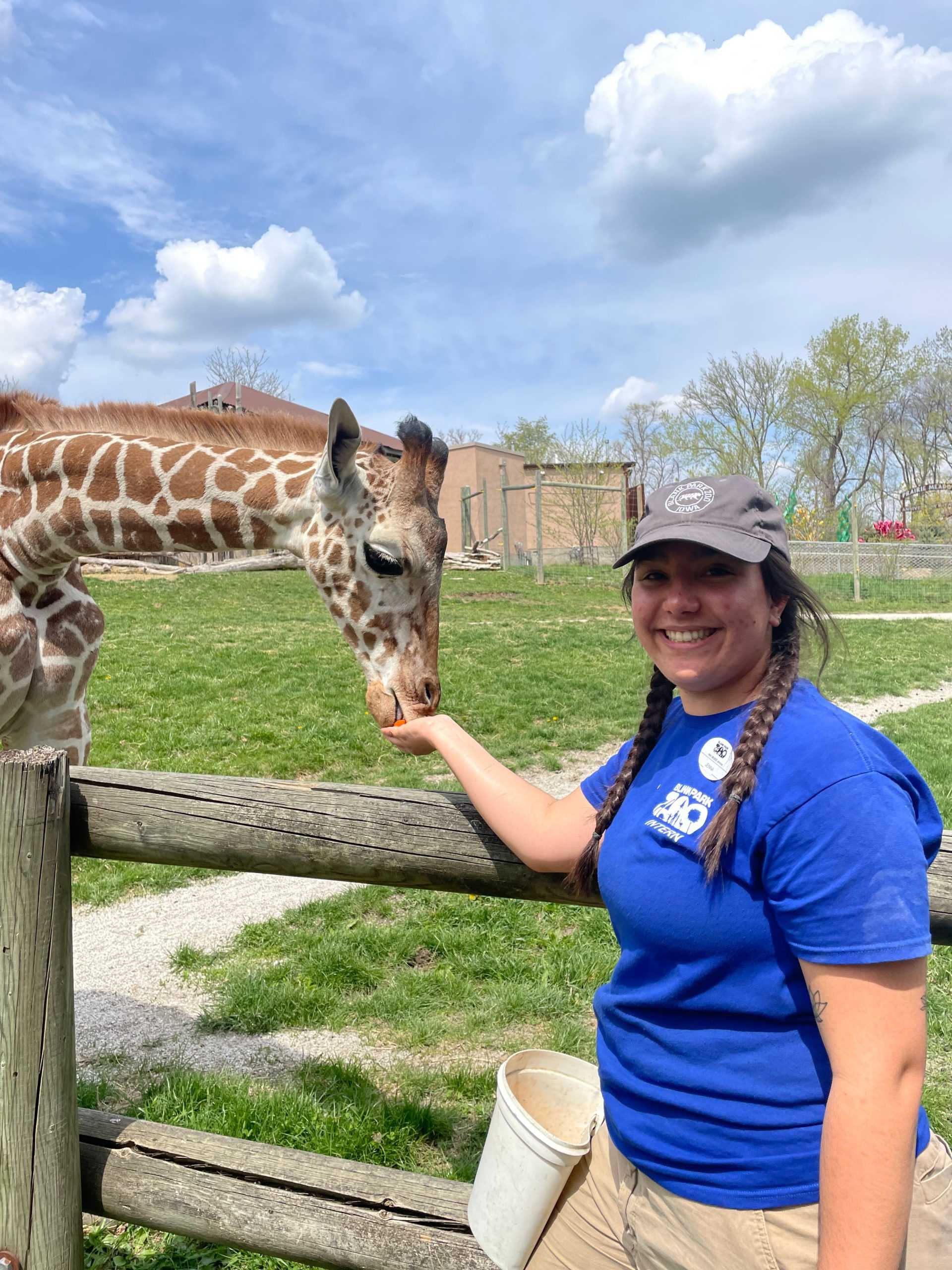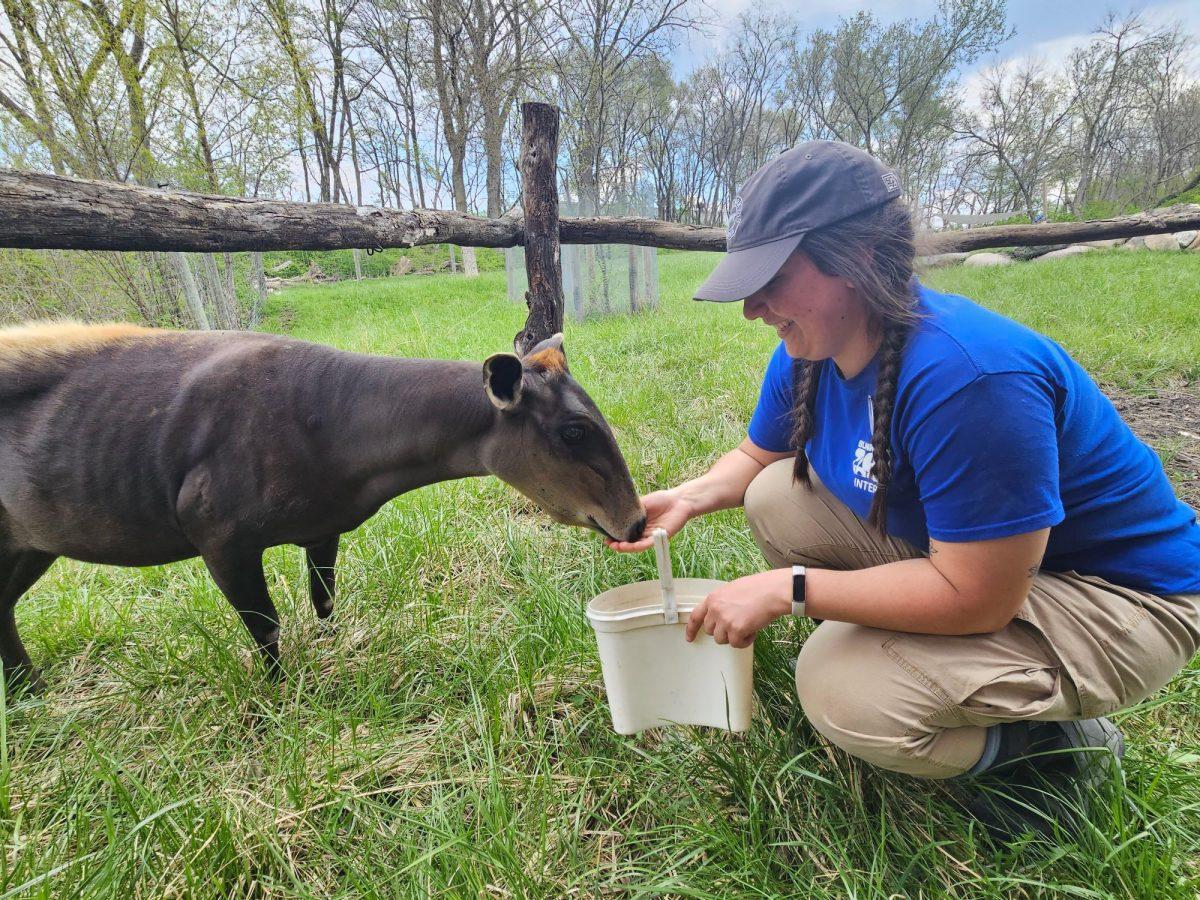During the second week of her internship at the Blank Park Zoo, Sabrina Delaney got to experience the birth of a baby giraffe, named Fakari, while working with the large mammals team.
“It was a really cool experience to be there and watch this baby giraffe. I saw him the day after he was born and then watched him grow up,” Delaney, a junior majoring in biology and zoo and conservation science, said.
Last year, Drake University introduced a zoo and conservation science major updating the program from a concentration. The program includes coursework in biology, psychology and environmental science and is designed to prepare students for working at zoos and conservation-based organizations. The program partners students with projects at the Blank Park Zoo and the Ape Cognition and Conservation Initiative as part of their required internship placements.
Converting the concentration to a major has not had a major negative impact on many students’ four-year academic plans because of the significant overlap between the requirements for the concentration and the current major.
“In the fall, I just converted my concentration to a major and the great thing was that my course load didn’t really change because of that,” Jenna Baker, a senior studying environmental science and zoo and conservation science, said.
When Delaney found out about the change to the new major, she was ecstatic.
“I said, ‘perfect.’ It didn’t affect me a lot because I was getting a lot of the requirements for the concentration already. When it became a major, a lot of the stuff it required, I’d already done through the biology side of it,” Delaney said.
Providing hands-on practical experience with internships is an integral part of the major as it aims to prepare students for careers in fields of animal behavior, conservation, zookeeping and wildlife rehabilitation.
Baker has worked at both the Blank Park Zoo and the Ape Cognition and Conservation Initiative as an animal care intern.

“I was excited to learn something new, and both of those internships helped because I wanted to work in animal care post-graduation,” Baker said.
Baker will be graduating this May and has accepted a job as an elephant keeper at a zoo in Oregon.
“Both of those experiences really helped me gain the necessary skills that I needed for a full-time permanent keeper position because I learned how to work with a wide variety of animals and how to work in a team environment,” Baker said.
Updating the concentration to a major also helped some students with the job application process. Students can now demonstrate their interest in their particular field rather than a broader degree like biology or environmental science.
“Being able to say I’m a [zoo and conservation science] major rather than saying I have a concentration adds a little bit more weight to my studies and makes it seem more legitimate,” Baker said.
The creation of the major allows for more specialized classes like endangered species conservation and avian winter ecology where students have the opportunity to design different behavioral studies and observe animal behavior.
“For a class, we had to use software that’s really popular in the zoo field. And for a different class, we had to use the endangered species list from the government and dig into those papers. It really allows you to see those aspects of the greater zoo field because there’s so many things that go into it that I think a lot of people don’t realize,” Delaney said.
Delaney, who took a J-Term travel seminar to Disney World in Orlando, Florida, said it helped her understand her passion for animal training.
“We got to talk to people that worked down there and worked with birds and experience that kind of animal training,” Delaney said. “I was obsessed. It was the coolest part of the trip. It was so incredible watching them train and work with the birds and develop those really special relationships.”
Delaney learned that she was fascinated by birds last summer at her internship where she worked with different raptors, owls, bald eagles and hawks.
“I work with Professor [Muir] Eaton now. We go out and do bird trapping every Friday. We catch birds, and then we write down a bunch of scientific information about them — how big they are, how much they weigh, how long their beaks are — and this information gets sent to the government. We also put little ID bands on them so that if they’re ever caught again, we can see where that bird’s gone, how that bird’s changed sizes,” Delaney said.
The major also provides students the opportunity to explore different aspects of the field. Baker added the concentration as a first-year because of the conservation subfield. It was only because of her internships that she realized that she wanted to work in the zoo environment.
“I found that I really enjoyed having close relationships with animals and being able to care for them and tell their stories to people,” Baker said. “Having this major has really shaped my professional goals and helped me narrow in on what I wanted to do after graduation.”







